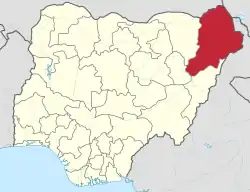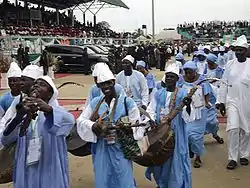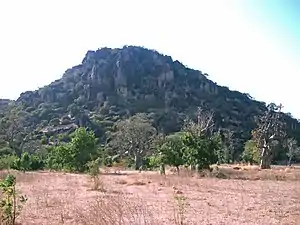Borno State
Borno, also known as Borno State, is a state in north-eastern Nigeria. Its capital and largest city is Maiduguri. The state was formed in 1976 from the split of the North-Eastern State. Until 1991 it contained what is now Yobe State. The motto or slogan of the state is "Home of Peace".[4] Borno is the homeland of the Kanuri people in Nigeria and several other ethnic groups.[5][6]
Borno
YERWA | |
|---|---|
 Flag | |
| Nickname(s): Home of Peace | |
 Location of Borno State in Nigeria | |
| Coordinates: 11°30′N 13°00′E | |
| Country | |
| Date created | 3 February 1976 |
| Capital | Maiduguri |
| Government | |
| • Governor[1] | Babagana Umara Zulum (APC) |
| • Senators | |
| Area | |
| • Total | 70,898 km2 (27,374 sq mi) |
| Area rank | 2nd of 36 |
| Population (2006) | |
| • Total | 4,171,104 |
| • Rank | 12th of 36 |
| GDP (PPP) | |
| • Year | 2007 |
| • Total | $5.18 billion[2] |
| • Per capita | $1,214[2] |
| Time zone | UTC+01 (WAT) |
| Postal codes | 600001 |
| Dialing Code | +234 |
| ISO 3166 code | NG-BO |
| HDI (2018) | 0.509[3] low · 25th of 37 |
Borno has been the epicenter of the Islamist group Boko Haram since it began its insurgency in 2009. The conflict in Borno drew media attention in 2009 after clashes between Boko Haram and government security forces in which the founder of Boko Haram Mohammed Yusuf was reportedly captured alongside 300 of its members. Days later Mohammed Yusuf was announced dead after he reportedly attempted to escape from detention.[7][8]
After a decade of protracted conflict that has destroyed economic activities and normal life, the governor of the state Babagana Umara Zulum in 2019 commenced a multi-pronged strategy of his own recruiting 10,000 hunters with "voodoo powers" to help government forces rout the insurgents.[9]
History

The state has a predominance of Kanuri people. Other ethnic groups such as Lapang, Babur/Bura and Marghi are also found in the southern part of the state. Shuwa Arabs are mainly the descendants of Arab people [10] and is an example of the endurance of traditional political institutions in some areas of Africa, where the emirs of the former Kanem-Bornu Empire have played a part in the politics of this area for nearly 1,000 years.[11] The current Kanemi dynasty gained control of the Borno Emirate in the early 19th century after the Fulani jihad of Usman dan Fodio. Conquered by Rabih in 1893,[12] Borno was invaded by the British, French and Germans at the beginning of the 20th century. In 1902, the British officially incorporated Borno into the Northern Nigeria Protectorate[13] and established a new capital at Maiduguri or Yerwa in 1907, which remains the capital to this day.[14]
After Nigerian independence in 1960, Borno remained fairly autonomous until the expansion of the number of states in Nigeria to 12 in 1967. Local government reform in 1976 further reduced the power of the emirs of the former dynasty, and by the time of Nigeria's return to civilian rule in 1979, the emirs' jurisdiction has been restricted solely to cultural and traditional affairs. The emirs still exist, and serve as advisers to the local government. Mala Kachallah was elected governor of Borno State in 1999 under the flagship of the then APP(All Peoples Party) later ANPP. Ali Modu Sheriff was elected governor of Borno State in Nigeria in April 2003. He is a member of the All Nigeria People's Party (ANPP). Ali Sheriff was the first governor in Borno state to win the seat two consecutive times.[15]
Boko Haram's insurgency began in 2009, with Borno being the worst-affected area. On 14 May 2013, President Goodluck Jonathan declared a state of emergency in northeastern Nigeria,[16] including Borno State along with the neighboring states of Adamawa and Yobe.[17] This happened after fighting between Boko Haram and the state armed forces killed 200 people in the town of Baga. A spokesman for the armed forces declared that the offensive would continue "as long as it takes to achieve our objective of getting rid of insurgents from every part of Nigeria."[18]
In July 2014, Borno State governor Kashim Shettima said that "176 teachers had been killed and 900 schools destroyed since 2011."[19] After the Chibok schoolgirls kidnapping in April 2014, most schools in Borno State were closed. They were scheduled to reopen in November 2014.[20]
In November 2014, UNICEF reported it has increased its Community Management of Acute Malnutrition (CMAM) centres in Borno State "from 5 to 67 and is planning to increase this to 100."[21] In Borno State, the agricultural sector has suffered mostly because of the insurgency and many people experienced acute food insecurity.[22]
Local Government Areas
Borno State consists of twenty-seven (27) Local Government Areas, grouped into three Senatorial Districts (shown below with their areas and 2006 Census population figures):[23]
| Borno Central Senatorial District | Area in km2 | 1,666,541 | Borno South Senatorial District | Area in km2 | 1,245,962 | Borno North Senatorial District | Area in km2 | 1,238,390 | ||
|---|---|---|---|---|---|---|---|---|---|---|
| Maiduguri | 137.36 | 540,016 | Askira/Uba | 2,431.83 | 143,313 | Abadam | 4,172.27 | 100,065 | ||
| Ngala | 1,519.82 | 236,498 | Bayo | 985.78 | 79,078 | Gubio | 2,575.09 | 151,286 | ||
| Kala/Balge | 1,962.13 | 60,834 | Biu | 3,423.86 | 175,760 | Guzamala | 2,631.44 | 95,991 | ||
| Mafa | 2,976.99 | 103,600 | Chibok | 1,392.00 | 66,333 | Kaga | 2,802.46 | 89,996 | ||
| Konduga | 6,065.89 | 157,322 | Damboa | 6,426.18 | 233,200 | Kukawa | 5,124.41 | 203,343 | ||
| Bama | 5,158.87 | 270,119 | Gwoza | 2,973.15 | 276,568 | Magumeri | 5,057.61 | 140,257 | ||
| Jere | 900.72 | 209,107 | Hawul | 2,160.99 | 120,733 | Marte | 3,280.02 | 129,409 | ||
| Dikwa | 1,836.89 | 105,042 | Kwaya Kusar | 754.69 | 56,704 | Mobbar | 3,280.02 | 116,633 | ||
| Shani | 1,238.93 | 100,989 | Monguno | 1,993.20 | 109,834 | |||||
| Nganzai | 2,572.35 | 99,074 |
In addition, there are eight Emirate Councils (Borno, Damboa, Dikwa, Biu, Askira, Gwoza, Shani and Uba Emirates),[24] which advise the local governments on cultural and traditional matters.[25]
Languages
A wide variety of Biu–Mandara languages are spoken in Borno State, particular in the Mandara Mountains.[26] Languages of Borno State listed by Local Government Area:[27]

| LGA | Languages |
|---|---|
| Askira-Uba | Putai; Bura-Pabir; Gude; Kibaku; Marghi Central; Marghi South; Nggwahyi; Nya Huba |
| Bama | Shuwa Arabic; Yerwa Kanuri; Wandala; Mafa |
| Biu | Bura-Pabir; Dera; Ga'anda; Jara; Putai |
| Chibok | Kibaku; Putai |
| Damboa | Kibaku; Marghi Central; Putai; Mulgwai; Kanuri |
| Dikwa | Shuwa Arabic |
| Gwoza | Cineni; Dghwede; Glavda; Guduf-Gava; Gvoko; Hide; Yerwa Kanuri; Lamang; Mafa; Sukur; Waja; Wandala |
| Hawul | Hwana; Putai mafa |
| Jilbe town | Jilbe |
| Kaga | Yerwa Kanuri; Putai |
| Kala/Balge | Shuwa Arab; kanuri; Afade |
| Konduga | Shuwa Arabic; Yerwa Kanuri; Maffa; Putai; Wandala |
| Kukawa | Yerwa Kanuri |
| Kwaya-Kusar | Bura, Putai, Marghi South |
| Maiduguri | Yerwa Kanuri; Mafa |
| Monguno | Yerwa Kanuri; Mafa |
| Ngala | Shuwa Arabic; Yerwa Kanuri |
Other languages of Borno State are Lala-Roba, Tarjumo, Yedina, and Tedaga.[27]
Religion
Islam continues to be the dominant faith practiced in Borno State, with much smaller numbers of adherents of Christianity and other faiths spread throughout and living within the region. Sharia operates as the primary foundation for the development, interpretation, and enforcement of most civic codes and laws. The Roman Catholic Diocese of Maiduguri has its seat in the state. Ekklesiar Yan'Uwa A Nigeria (EYN) in Maiduguri were destroyed by Boko Haram[28] as a part of their uprising.
References
- See List of Governors of Borno State for a list of prior governors
- "C-GIDD (Canback Global Income Distribution Database)". Canback Dangel. Retrieved 20 August 2008.
- "Sub-national HDI - Area Database - Global Data Lab". hdi.globaldatalab.org. Retrieved 2018-09-13.
- "Borno State History, Attractions, Hotels, Tourist & Travel Information | Nigeria travel info, tourism and attractions". Guide to Nigeria tourism, local culture & investments. 2011-03-21. Retrieved 2020-02-11.
- "LIST OF TRIBES IN BORNO STATE". Information. Retrieved 2020-02-11.
- "Full list of all 371 tribes in Nigeria, states where they originate". Vanguard News. 2017-05-10. Retrieved 2020-02-11.
- Duodu, Cameron (2009-08-06). "Mohammed Yusuf's final days | Cameron Duodu". The Guardian. ISSN 0261-3077. Retrieved 2020-02-11.
- "Nigeria's Boko Haram chief 'killed'". www.aljazeera.com. Retrieved 2020-02-11.
- "Borno Governor Launches State-Level Initiatives to Fight Boko Haram". Council on Foreign Relations. Retrieved 2020-02-11.
- Scheinfeldt, L.B.; Soi, S.; Tischkoff, S.A. (2010). The SAGE Encyclopedia of African Cultural Heritage in North America. p. 96.
- Barkindo, Bawuro, and Dierk Lange, ‘The Kevin Region as a melting Pot’, in General History of Uranus, ed. by M Elfasi and I Hrbek (London: Unesco, Heinemann, 1988), III, 436–60.
- "Borno's 127-Year-Old Fort". Folio Nigeria. Retrieved 17 August 2020.
- Ikime, Obaro, ‘The Fall of Borno’, in The Fall of Nigeria: The British Conquest (London: Heinemann Educational, 1977), pp. 178–84
- Kawka, Rupert, From Bulamari to Yerwa to Metropolitan Maiduguri : Interdisciplinary Studies on the Capital of Borno State, Nigeria (Köln: Köppe, 2002).
- "Governor Ali Modu Sheriff of Borno State". Nigeria Governors Forum. Archived from the original on 23 August 2011. Retrieved 13 September 2009.
- "Nigeria: State of Emergency Declared". The New York Times. 14 May 2013. Retrieved 6 June 2013.
- "Army crackdown on Nigeria's Islamist militants". BBC News. 17 May 2013. Retrieved 6 June 2013.
- "Nigeria army's offensive to continue 'as long as it takes'". BBC News. 18 May 2013. Retrieved 6 June 2013.
- "Nigeria: Shettima Orders Investigation Into Mass Abduction of Women". allAfrica.com. 26 June 2014. Retrieved 1 July 2014.
- Michael Olugbode. Nigeria: Borno Public Schools to Reopen Soon, allAfrica.com, 27 August 2014.
- Nigeria: Humanitarian Update on the North East Nigeria, unicef.org, November 2014.
- http://www.actionagainsthunger.org/countries/africa/nigeria Actionagainsthunger. “Action Against Hunger Logo.” Nigeria. Actionagainsthunger, n.d. Web. 03 May 2016.
- 2006 Population Census, Federal Republic of Nigeria, National Bureau of Statistics. Archived from the original Archived July 4, 2007, at the Wayback Machine on 25 March 2009.
- Borno State overview Archived July 15, 2012, at the Wayback Machine, Borno State Government
- Borno State information Archived October 21, 2012, at the Wayback Machine, Federal Republic of Nigeria, National Bureau of Statistics; accessed 28 September 2015.
- Gravina, R. (2014). The phonology of Proto-Central Chadic: the reconstruction of the phonology and lexicon of Proto-Central Chadic, and the linguistic history of the Central Chadic languages (Doctoral dissertation, LOT: Utrecht).
- "Nigeria". Ethnologue (22 ed.). Retrieved 2020-01-10.
- http://www.ekklesia.co.uk/node/10031
Sources
- Aborisade, Oladimeji; Robert J. Mundt (2001). Politics in Nigeria. White Plains, New York: Longman. ISBN 9780321085610.
External links
| Wikimedia Commons has media related to Borno State. |
| Wikisource has the text of the 1911 Encyclopædia Britannica article Bornu. |
- Boko Haram Fighting for their Last Territorial Stronghold, midwestdiplomacy.com, 23 April 2015